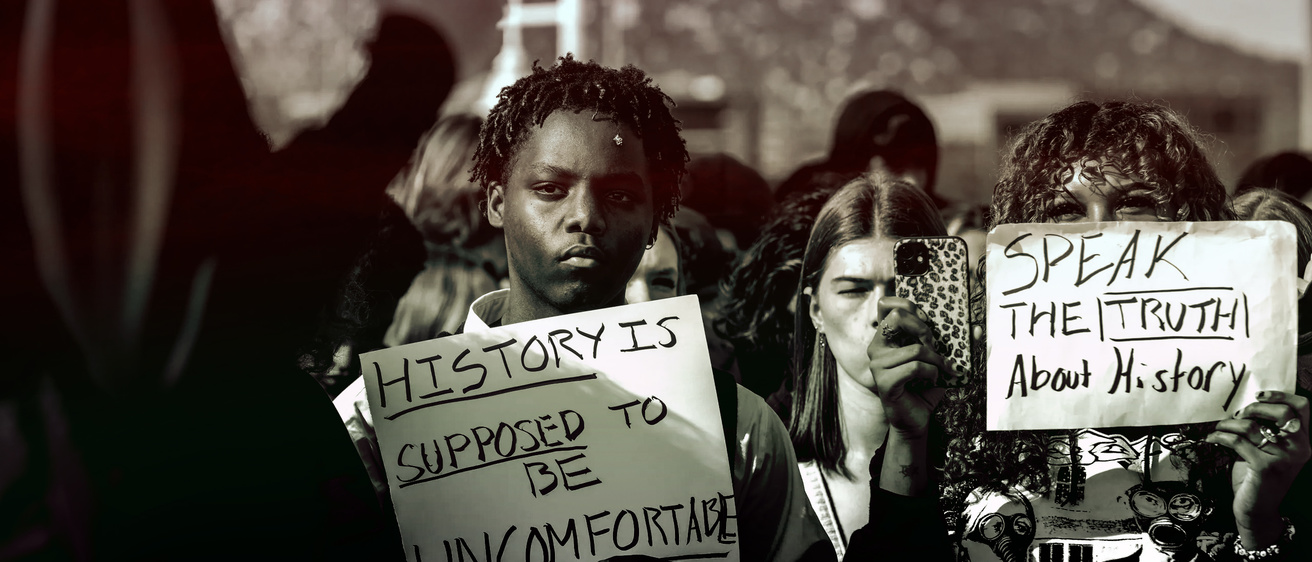On July 19, 2023, the Florida Board of Education announced new guidelines for the curriculum on black history. These guidelines include the teaching of middle schoolers on how slavery was mutually beneficial.[1] Slaves were tortured, whipped, raped, and kept in inhumane conditions while being forced to work with no compensation. Regardless, some states want educators to teach students that the relationship was mutually beneficial as slaves developed skills. These skills “could be applied for their personal benefit.”[2] This in no way constitutes a beneficial relationship and diminishes the truth.
Actions like the Florida Board of Education’s guidelines are part of a larger crusade against the teaching of the whole unequivocal truth of slavery and black history in the United States. Lawmakers fear teaching black history and its gory moments will make white children feel guilty for their ancestors’ actions. The point of history is to acknowledge the past.[3] In acknowledging that past, one is likely to stumble into unpleasant moments of time. History contains stories of the past that are necessary for understanding today.[4] When history is tampered with, understanding of society is skewed.[AO1]
Florida’s new guidelines follow a larger trend of the erasure of black history that paints white people as oppressors. Florida wants to believe slavery was mutually beneficial. The NAACP president Derrick Johnson criticized the new guidelines,
Today's actions by the Florida state government are an attempt to bring our country back to a 19th century America where Black life was not valued…We refuse to go back. The NAACP has been fighting against malicious actors such as those within the DeSantis Administration for over a century, and we're prepared to continue that fight by any means necessary[AO2] .[5]
In Arkansas, Governor Sarah Huckabee Sanders and the state legislature decided that students taking AP African American History would not be able to receive credit as the class “indoctrinate[s] students with ideologies.”[6] On January 10 of this year and following the murder of George Floyd, Governor Sanders signed an executive order that essentially[AO3] [AO4] banned the teaching of factual black history as well as removing anti-bias training.[7] Five of the Little Rock Nine, who notably were the first students to desegregate Little Rock Central High School in Little Rock, Arkansas were justifiably upset with the order.[8] The Little Rock Nine deserve to have their story told in schools, “[they] consider the accurate retelling of [their] history an American right … a necessity for student learning and mandatory for educational progress in this country.”[9]
LaGarett J. King, the founder and director of the Carter Center for K-12 Black History Education at the University of Missouri and professor of social studies education at the University of Buffalo, says on the subject, “[W]hite people have been told that they’re the most historically important people in the world.[10] So when they’re not centered in that narrative…then they tend to say this is not of educational value[AO5] .”[11] He goes on to state that in order for students to be able to compare the past to what has happened recently in the present they must be able to think and negate narratives that paint slavery positively.[12]
Black history is necessary to accurately depict United States history, it is also necessary for black students to relate and see themselves in United States history[AO6] . Black history is not limited to slavery, but that is the main topic within this conversation.[13] With the removal of in courses, such as AP African American History, students are deprived of the opportunity to see black people in important roles, representation matters.[14] Even when notable black people are taught in history lessons, they are sparse. The current students of today are the lawyers, doctors, and leaders of the future. Black lawyers make up 5 percent of the legal field despite being 13 percent of the population.[15] With laws such as the ones above, it is important to have people who not only understand the importance of courses that speak to black history and its unique experiences, but people who have the ability to make sure policies do not limit but promote diversity and equity.[16]
History must be taught truthfully in order to accurately understand the past, and in turn understand how that has affected today. States like Florida, Arkansas, and a host of others are not attempting to teach children history. A whitewashed version of history is being taught––one that is palatable and aligns with the way they view and value of the importance of black lives in America and its history.
[1] Solcyre Burga, Florida Approves Controversial Guidelines for Black History Curriculum. Here's What to Know, Time (July 20, 2023), https://time.com/6296413/florida-board-of-education-black-history [https://perma.cc/F9SQ-H6L9].
[2] Id.; Omékongo Dibinga, How Do We Teach Black History in Polarized Times? Here’s What It Looks Like in 3 Cities, Hechinger Rep. (Aug. 2, 2023), https://hechingerreport.org/how-do-we-teach-black-history-in-polarized-times-heres-what-it-looks-like-in-three-cities [https://perma.cc/YSL4-VVZX].
[3]Peter N. Stearns, Why Study History?, Am. Historical Ass’n (1998), https://www.historians.org/about-aha-and-membership/aha-history-and-archives/historical-archives/why-study-history-(1998) [https://perma.cc/292X-AWYK].
[4] Id.
[5]Press release, NAACP, NAACP President Decries New Florida Board of Education Rules (July 19, 2023), https://naacp.org/articles/naacp-president-decries-new-florida-board-education-rules [https://perma.cc/KEL7-2XXS].
[6] Valerie Strauss, Five of Little Rock Nine on Arkansas’ Attempt to Erase Black history, Wash. Post. (Aug. 22, 2023), https://www.washingtonpost.com/education/2023/08/22/arkansas-erase-black-history-littlerock9 [https://perma.cc/Q4P2-UJNH].; Ark. Exec. Order No. 23-05 (Jan. 10, 2023).
[7] Id.
[8] Id.
[9] Id.
[10] Dibinga, supra note 2.
[11] Id.
[12] Id.
[13] Coshandra Dillard, Black History Month: Teaching Beyond Slavery, Learning For Just. (Jan. 29, 2019), https://www.learningforjustice.org/magazine/black-history-month-teaching-beyond-slavery [https://perma.cc/DC8S-CQZ3].
[14] Marybeth Gasman, Why We Need More African American Lawyers, Forbes (Mar. 16, 2023), https://www.forbes.com/sites/marybethgasman/2023/03/16/why-we-need-more-african-american-lawyers/?sh=656e341b14cd [https://perma.cc/G5V5-HZVG].
[15] Id.
[16] Id.; Angela Winfield, Why Black Lawyers Matter, LSAC (Oct. 7, 2021), https://www.lsac.org/blog/why-black-lawyers-matter [https://perma.cc/W224-SRCC].
